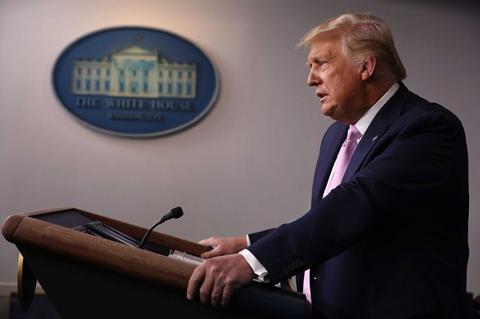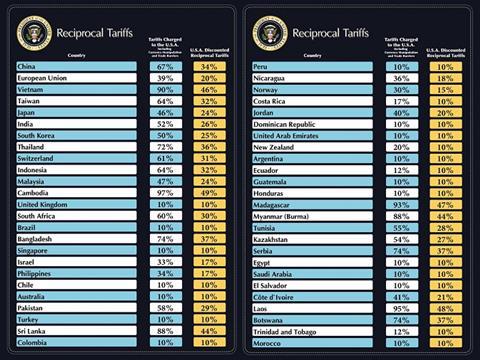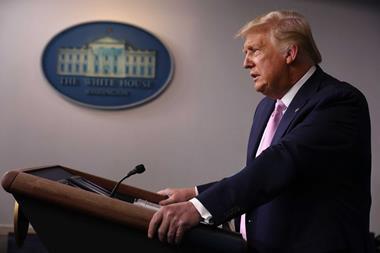
Last night saw US president Donald Trump reveal a slew of new tariffs and also confirm the date from which Chinese goods will no longer benefit from the de minimis exemption.
In what the president has dubbed ‘liberation day’, Trump announced a universal 10% tariff on imports into the country, while certain nations are subject to higher levels.
A chart highlighting the tariff changes on a country-by-country basis showed that imports from China would be subject to tariffs of 34%, the European Union 20%, Vietnam 46% and Taiwan 32%. These are due to come into force on 9 April while the universal tariffs are due on 5 April, giving countries little time to negotiate with the US.
According to forwarder Flexport, China's tariffs are on top of section 301 tariffs, the 20% tariff implemented in early March, and baseline US tariffs.
Last week, the Trump administration also announced a 25% tariff on autmobiles that starts today, along with a 25% tariff on automobile parts due to come into force in May.
He has also previously implemented a 25% tariff on all Canadian and Mexican imports that are not covered by the North American free-trade agreement.

Market analyst Xeneta said it is not expecting the tariffs to result in an immediate jump in airfreight rates but could result in demand decreases as a result of lower consumer demand due to higher prices.
Niall van de Wouw, Xeneta chief airfreight officer, said: “We saw an uptick in air cargo rates from China and Europe to the US at the end of March but nothing to set alarm bells ringing. The more likely scenario is a decrease in air cargo rates if tariffs result in higher prices and lower consumer demand.
“We could also see lower demand for US exports if there is growing anti-US sentiment across consumers in regions hit by the tariffs. Consumer sentiment has the potential to be even more powerful than tariffs.
“We should also consider there will be more capacity added to these trades in the coming weeks as airlines start summer schedules, which will also put downward pressure on rates.”
According to Xeneta figures, air cargo spot rates currently stand at $4.16 per kg from Shanghai to US, down from the peak season high of $5.75 per kg in the week ending 10 November.
Spot rates from western Europe to the US stand at $2.16 per kg, down from the peak season high of $3.51 per kg in the week ending 15 December.
US retailers are expecting the tariffs to hit US consumers' spending power and warn the sudden implementation will create issues.
“Tariffs are a tax paid by the US importer that will be passed along to the end consumer," said National Retail Federation executive vice president of government relations David French. "Tariffs will not be paid by foreign countries or suppliers.
“Even more so, the immediate implementation of these tariffs is a massive undertaking and requires both advance notice and substantial preparation by the millions of US businesses that will be directly impacted."
De minimis update
Amongst the various executive orders issued by the White House yesterday was an update on the end of the de minimis exemption for imports from China.
The US had tried to end the exemption that allows packages worth less than $800 to enter the country tariff-free and with minimal customs scrutiny in February.
But the country was forced to backtrack on its plans when it became clear customs did not have the systems in place to process the millions of packages that arrive from China every day.
However, the White House yesterday issued an update, saying that it planned to remove the exemption for China packages from 2 May. Packages that are sent through international postal networks will be subject to a different set of duties than those that are sent by other modes of transport.
"Imported goods sent through means other than the international postal network that are valued at or under $800 and that would otherwise qualify for the de minimis exemption will be subject to all applicable duties, which shall be paid in accordance with applicable entry and payment procedures,” the White House said.
"All relevant postal items containing goods that are sent through the international postal network that are valued at or under $800 and that would otherwise qualify for the de minimis exemption are subject to a duty rate of either 30% of their value or $25 per item (increasing to $50 per item after June 1, 2025).
"This is in lieu of any other duties, including those imposed by prior orders.”
The different rules depending on how items are sent is likely to differentiate between small-scale shippers and e-commerce giants such as Shein and Temu which have such large volumes that they are able to charter aircraft and create direct commercial agreements with airlines to move their goods.
The impact of the removal of the de minimis exemption on e-commerce volumes, which has helped fuel a boom in air cargo in recent years, is debated.
Some are expecting it to have a large impact on the market, while others argue that the goods are so cheap anyway that adding a few extra dollars on top won't make too much of a difference.
Others, however, say the need for customs to process packages will slow delivery times and make the overall proposition less attractive to consumers.
There are also expected to be changes to e-commerce supply chains, with Chinese firms utilising a more traditional distribution setup, with warehouses in the US to store goods and an increased use of ocean shipping.
They could also export from countries that are still able to benefit from the de minimis exemption or go through Mexico and Canada.
Shipping upside
While the latest developments are likely to be a blow to air cargo demand expectations, there is one geopolitical development that is expected to result in increased volumes if it is implemented.
The Office of US Trade Representatives (USTR) has proposed a fee ranging from $500,000 to $1.5m per US port call by any Chinese carrier, Chinese vessel, or other carrier that has Chinese vessels as part of their global fleet.
Ocean container carriers are expected to try and avoid the fees by calling at fewer ports, which could cause major congestion and delays to the US.
Xeneta's van de Wouw said: “The proposed fees on Chinese vessels and carriers entering US ports could have a more significant impact if congestion in ocean container supply chains causes shippers to move more goods by air.
“With around 98% of the world’s goods transported by ocean, it doesn’t take much of a percentage shift to have major implications for air freight, as we saw during Covid-19 and the Red Sea crisis.”


















